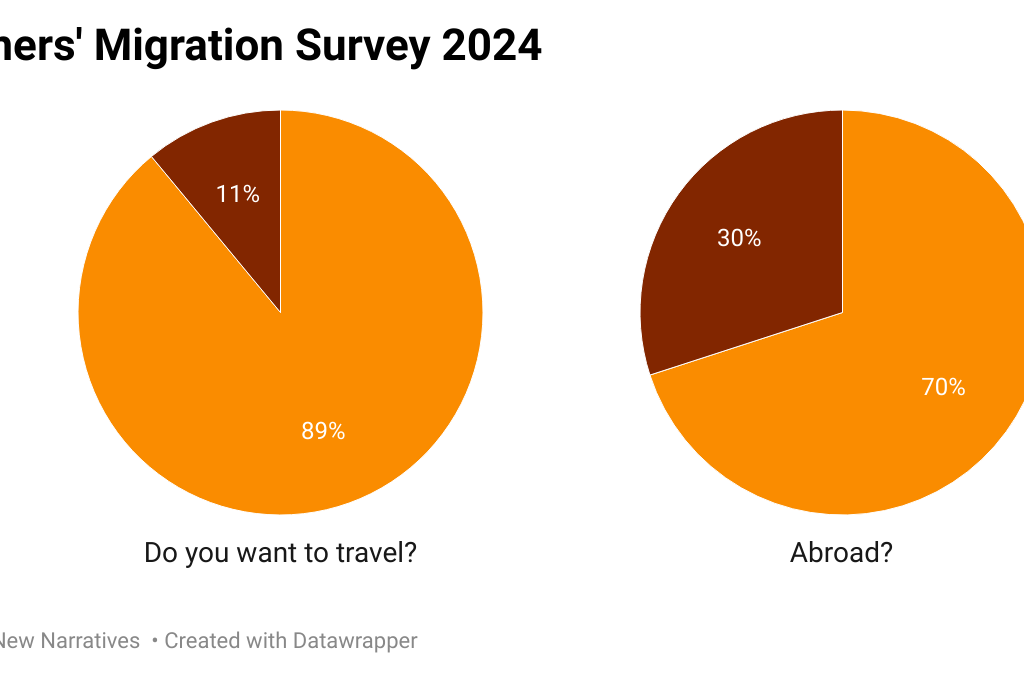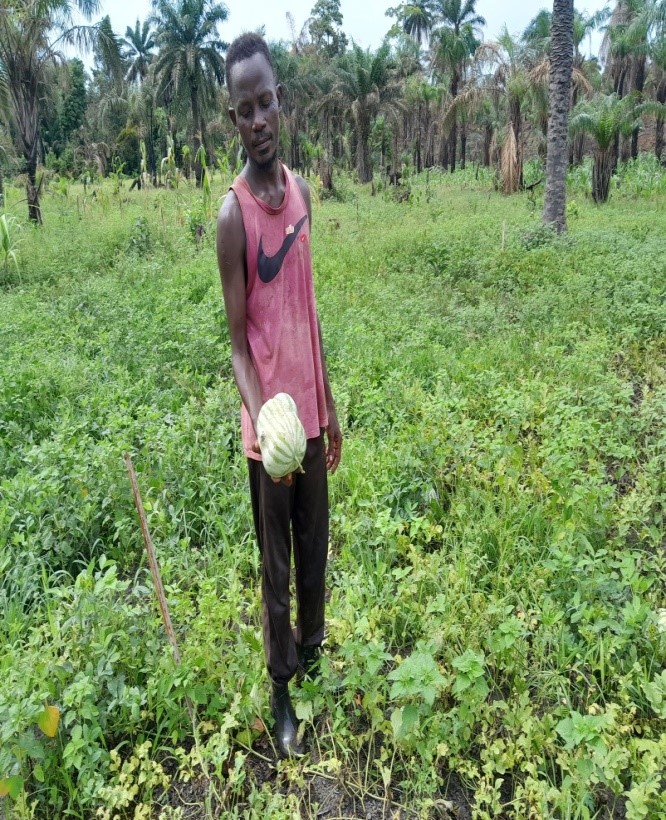PHOTO: Farmer Tony Kessely is frustrated by his failed watermelon crop
By King Brown with New Narratives
BUCHANAN, Grand Bassa County -Tony Kessely and his son Togar sit one afternoon watching the sun go down on their small plot of land here. Tony, 40, raised 20-year-old Togar and his three siblings on this farm, growing watermelons and peanuts.
The two used to spend this time planning activities for the next day. But now they spend their time in despair, thinking how they might save their crops from another year of failure.
“This time, we don’t understand weather conditions anymore,” says Tony, describing the changing weather patterns as a crisis. “Rainfall when it’s not supposed to fall and sunshine when it not supposed to shine giving our plants hard time to survive.”
As a result of the increasingly unpredictable climate, Kessely says he plans to migrate overseas and “haul cartons” rather than stay here planting crops the return nothing.
“If anyone is willing to sponsor my journey overseas, I would definitely say yes,” says Tony. “I want to work hard and improve my life and my children’s future. Farming is difficult and often frustrating despite over efforts.”
Tony is one of 300 farmers aged 40 years and under, in five counties, who took part in a national New Narratives survey. Nine in every ten farmers interviewed in Grand Bassa, Rivercess, Bong, Nimba, and Montserrado counties, said they wanted to travel for better job and education opportunities after years of seeing climate change ravage their crops. Some planned to travel to Monrovia or seek opportunities at small scale mining sites, but two in every three wanted to travel abroad with the United States being the favored destination.
Liberia is a center of a global migration crisis. West and East Africa are two of the areas hardest hit by climate change. Millions of people are already on the move seeking a better life. Africa Shifts, a 2022 report, projected that number of Africans migrating because of climate change will increase from 1.5 percent today to as many as 5 per cent, or 113 million people, by 2050.
As the number of migrants increases so too has the number of traffickers and other scammers seeking to prey on them. Thousands are dying each year on dangerous illegal migration routes from Africa to Europe and Central America to the United States.Liberia is ranked 171st out of 181 countries in Africa in terms of vulnerability to climate change impacts. Climate change is taking 1 to 2 percent from economies across the continent.

A team of New Narratives reporters conducted the national survey in February and March hoping to get an understanding of how subsistence farmers – as many as four in every five Liberians – are coping with the growing crisis in farming. The large number who were seeking to travel did not surprise agriculture or anti-trafficking experts. But they warned that Liberians face grave dangers travelling abroad.
Mercy Pyne, Assistant Director at the Ministry of Labor’s Human Trafficking Division, pointed to the hundreds of Liberians who have been caught up in trafficking scams to the Middle East. Most ended up trapped as domestic servants in slave-like conditions. Some have died.
“You got to be careful who you talk to on social media,” warns Pyne. “They keep leaving Liberia thinking they will get better living but every time they go there they see it’s not better. When you are caught sometimes they take your organ, they take your living parts from you to sell it. Sometimes you don’t live to tell the story.”
Many of the farmers surveyed had heard of the dangers of travelling but very few were deterred. Most expressed confidence that they would spot a scam where others had failed. About ten per cent of survey recipients reported online interactions that appeared to be with scammers. Tony Kessely says he has heard the bad stories but he is not concerned.

Tony shows a shrivelled peanut plant. “When you pea the nut, no peanut inside
Last year’s farming has been the most challenging that Kessely have faced. The family planted corn, watermelon, cucumbers, potatoes, and peanuts, but none produced fruit. He is now removing the peanuts to replace them with bitter balls. With unpredictable rain and excess temperatures they do not have much hope this crop will fare any better.
Tony Kessely says he has no other options in Liberia as farming is the only skill he knows. He is considering South Africa or the United States as potential destinations where he has heard there are opportunities.

In Zahn Town Blessing Sakou is having the same thoughts. The 20-year-old is in the 8th grade but he sees no future here. Blessing and his father managed large cassava farms, but things have changed now. Poor harvests have driven away buyers. Sakou says they now only purchase small portions of their products, leaving the majority to spoil. Blessing’s father can no longer afford to pay for his school supplies, so Blessing has no hope of studying for a different future than this.
His dream is to travel to the US. He says he has seen movies of young Liberians in America attending schools and earning money – things he can only dream of. Sakou has heard about the dangers of traveling but he doesn’t care. He is determined to go any way he can.
“I feel so embarrassed living in here,” Sakou says. “No support, bad labour practices, and hardship are on the increase. In other countries, when people make farms, you see surplus buyers, but it’s on the opposite in Liberia.”
Blessing’s sister Naomi, 33, and four other cassava farmers here are already engaged in conversations with individuals online from South Africa, Nigeria, and Sierra Leone. They say they are “friends” on Facebook and regularly chat via messenger.
The Facebook contacts have told them about job opportunities and scholarships in these countries, which have fueled their desire to travel. Experts warn such Facebook contacts usually end up being scammers. There are no scholarship or work opportunities for Liberians who do not have exceptional academic and work records. They warn Liberians to never send money to people online or to allow people they don’t know to secure travel documents for them.
Such warnings have not reached survey participants in Grand Bassa. If they did, it’s not clear people would believe them.
“My heart is no longer in Liberia,” says Naomi Sakou. “I am in touch with people living in South Africa on my phone. I have someone there who has agreed to host me if I go today. I just need money, and I believe I will get it by God’s grace.”
J-Fred Williams, a 40-year-old father of seven children, lives with his wife and children in Benson River community. He has abandoned plans to pursue large-scale farming. Instead, he plants only what his family can eat.
“This thing called climate change, I don’t know where it comes from because we never used to experience these kinds of issues,” he says. “Throughout my life, I’ve survived by farming and benefiting from my labor, but I don’t understand what’s happening to Liberia.”
Williams’s third son, Abel, aged 23, wants to travel abroad to support his struggling parents. Abel is saving money with a daily savings collector to join a friend travelling abroad. He doesn’t care where.
“I want to travel anywhere else,” he says. “I just don’t want to be in Liberia anymore. I am saving money, and once it reaches the amount needed to travel, I will join one of my friends, and that’s it.”
In Grand Bassa County, at least 50 percent of farmers and their children expressed a desire to travel abroad, with 28 percent hearing about it from friends and family. Twenty-two percent mentioned obtaining travel information from social media. One-third of them aim to go for education, while half are seeking scholarships.
Among those planning to go overseas, half are saving money, while others are relying on “playing DV” – applying for the United States diversity visa lottery. Four percent of them intend to move to Monrovia, while others prefer traveling to abroad, with the U.S. being their favorite destination.

Too much sun is causing Sam Gaye’s cassava leaves to turn yellow instead of green
Sam Gaye, 40, has already moved because of climate change. He left his hometown of Tepenneh Town and migrated to Big Joe Town, about a 15-hour ride by motorbike. Gaye says climate change had impacted three different rice farms he had established. In search of more suitable farming conditions, Gaye moved to Big Joe Town. But the same has happened here.
He’s now trying cassava but already the signs are not good. Newly planted cassava has not shown much progress, with the leaves turning yellow and drying up.
Joseph Vambo is an agriculture expert here. He is one of many experts urging farmers here to give up plans of migrating and focus on adapting their crops to more climate resilient seeds and methods.
“Every crop has its own planting season, but farmers must be aware of rainfall and sunlight patterns. Rice, cassava, peanuts, watermelon, corn, and cucumbers each have their ideal planting times, which farmers often overlook,” Vambo says.
With 37 years of experience in agriculture Vambo, also urges farmers to test the soil. He noted that due to climate change, soils are changing, making it difficult for certain plants to prosper.
David Kpogbah, another agriculture expert, with 38 years’ experience, serves as the head of Garmamu Multipurpose Cooperative Society. He urges farmers here to persevere rather than resort to migration. He reminds them that climate change affects the entire world and relocating won’t solve their issues.
Kpogbah recommends the use of biochar to retain moisture in the soil and aid plant growth. He is one of many experts calling on the government to do much more to train farmers on navigating the advantages and disadvantages of climate change.
Experts across the board are now urging the government to invest in a two-pronged approach to help farmers adapt to climate change and raise awareness about the grave dangers of migration. Until that happens, they say, Liberia risks a double crisis of food insecurity and many young people becoming victims abroad.
This story was a collaboration with New Narratives. Funding was provided by the American Jewish World Service and US and Swedish embassies. Funders had no say in the story’s content.
Additional reporting by Evelyn Kpadeh Seagbeh, Eric Opa Doue, Jerome Saye, Joseph Titus Yekeryan and Nukanah Kollie.

